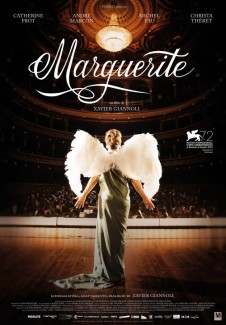Marguerite (Xavier Giannoli, 2015): France, Czech Republic, Belgium
Reviewed by Markus Linecker. Viewed at the Santa Barbara Film Festival 2016.
In the beginning of the screening, the subtitles were not showing fully. It threw many people in the audience off – they started reacting to the inability to understand the film, whistling, applauding, and clapping raucously because they wanted the people running the movie to fix it. The projectionists started over again, and the subtitles still didn’t work. The crowd, having waited with anticipation, became even louder in their displeasure. Some got up and left, talking upset and loudly, but most stayed for the third round of the first ten minutes of the increasingly familiar film. This time it worked, and everyone responded with relief and applause. Finally, we could understand why all these characters were milling through a rich person’s house and grounds. They were there to watch in fascinated horror as Marguerite (Catherine Frot) horribly mangles a different artistic endeavor – in her case, opera. Did the projectionists engage in a bit of performance art by flubbing up the subtitles, creating a reaction within the actual audience to emphasize the film audience’s horrified reactions to the main character’s artistic failures? We will never know.
Marguerite has elements of comedy, but we felt sorry for the woman at the same time as she yowls out her opera pieces. It is set in Paris in the 1920s, and accesses all the elements of society of the time period, from vieux riche and nouveau riche, to anarchists and freaks, homosexuals and servants. In the beginning of the movie, we are drawn into a party in a mansion, and the main characters are revealed quickly from the perspective of some of the lesser characters. This remains the construction of the film, where the minor characters are drawn into orbit around the major characters and their issues.
Marguerite Dumont is a middle-aged rich woman who surrounds herself in opera and the delusion that she can be a classical singer. She is the one giving the concert in her house, where a couple of young newspaper reporters come to ogle and end up getting more than they bargained for. They originally intend to swindle her, but they end up, against all conventional wisdom, encouraging her in her painful delusion. Everyone in the movie goes along with this, including her beleaguered husband Georges (Andre Marcon) who is the object of her unrequited devotion. His foil is their butler Madelbos (Denis Mpunga): every time her husband pushes her away in shame and derision, Madelbos finds a way to encourage her, almost worshiping her misguided passion. These complex supporting characters all intertwine to create an avant garde impression.
The mise-en-scene also intrudes to become almost one of the characters at times, such as when the chandelier swings in the sitting room, indicating solitude and lack of connection with others on Marguerite’s part. The vintage opera costumes that she wears for Madelbos’ photography, the projection of war scenes on her white robe as she sings the French national anthem – many times, the story is told through the costuming as much as through the dialogue.
Marguerite does all this because she wants to impress her husband, something that will draw him back to her. The movie is pretty evident in that subtext, as a number of characters inform her husband of this, making him the truly dynamic character of the piece: will he take her or won’t he? It is worth watching, to find out.
About this entry
You’re currently reading “Marguerite (Xavier Giannoli, 2015): France, Czech Republic, Belgium,” an entry on Student Film Reviews
- Published:
- 02.21.16 / 12pm
- Category:
- Films, Santa Barbara Film Festival 2016

2 Comments
Jump to comment form | comments rss [?]